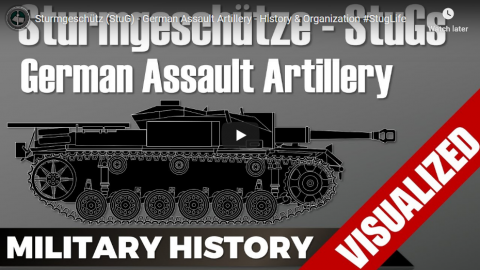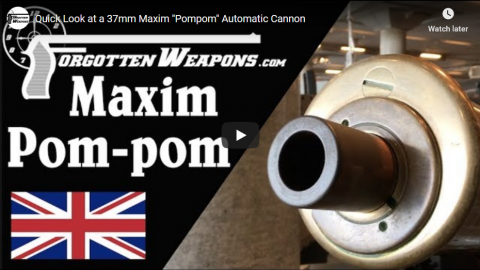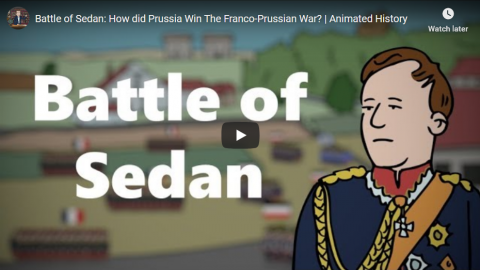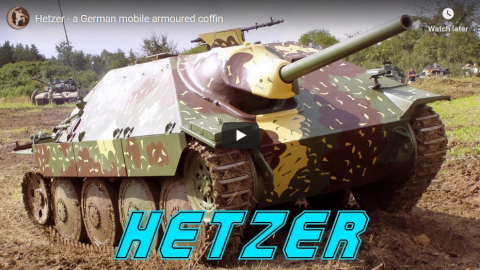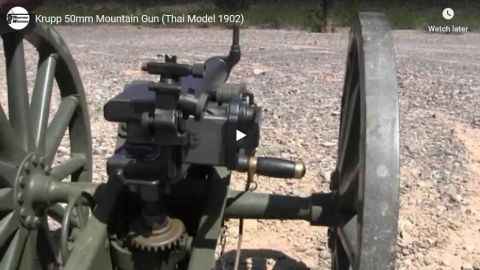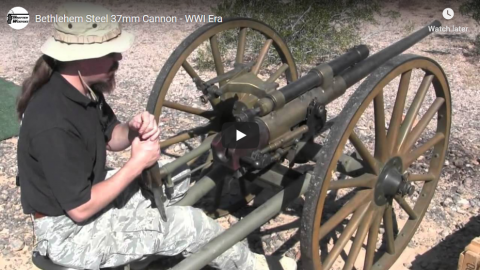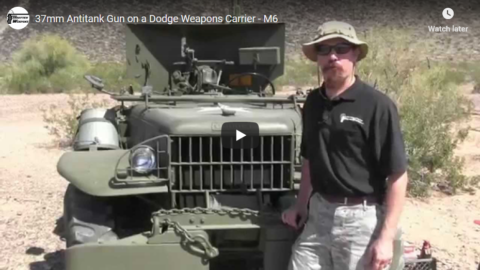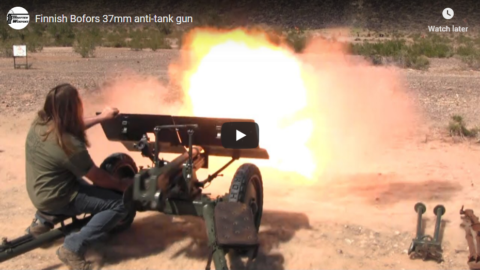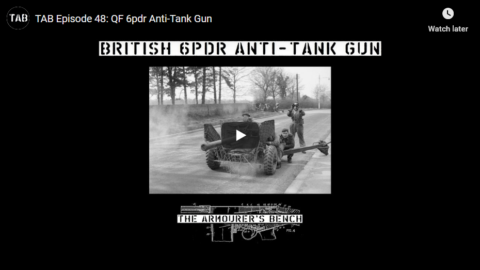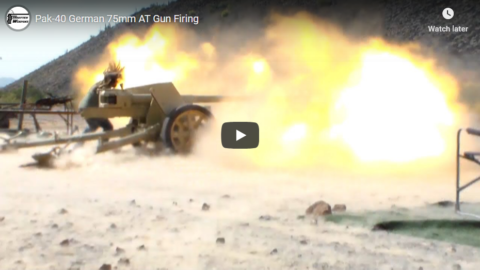Military History Visualized
Published 15 Jul 2016» HOW YOU CAN SUPPORT MILITARY HISTORY VISUALIZED «
(A) You can support my channel on Patreon: https://www.patreon.com/mhv(B) You can also buy “Spoils of War” (merchandise) in the online shop: https://www.redbubble.com/people/mhvi…
(C) If you want to buy books that I use or recommend, here is the link to the Amazon Store: http://astore.amazon.com/ytmh-20 which has the same price for you and gives a small commission to me, thus it is a win/win.
Short video about the famous German “StuGs” (Sturmgeschütze) Assault guns. The initial concept, organization and development from infantry support to mainly the tank destroyer role.
Script & Further Information: http://militaryhistoryvisualized.com/…
—Sources—
Wettsein, Adrian: “Sturmartillerie Geschichte einer Waffengattung”
http://portal-militaergeschichte.de/s…Spielgerger, Walter: Sturmgeschutz & Its Variants
Amazon.com (affiliate link): http://amzn.to/29FLo3SSpielberger, Walter: Sturmgeschütze. Entwicklung und Fertigung der sPak
Amazon.de (affiliate link): http://amzn.to/29FTHeFFleischer, Wolfgang: Die deutschen Sturmgeschütze 1935-1945.
Amazon.de (affiliate link): http://amzn.to/2a0ctCaBuchner, Alex: The German Infantry Handbook 1939-1945
amazon.com (affiliate): http://amzn.to/1l4ABU0Buchner, Alex: Das Handbuch der deutschen Infanterie 1939-1945; Gliederung – Uniformen, Bewaffnung – Ausrüstung, Einsätze
amazon.de (affiliate): http://www.amazon.de/gp/product/38955…-Disclaimer-
Amazon Associates Program: “Bernhard Kast is a participant in the Amazon Services LLC Associates Program, an affiliate advertising program designed to provide a means for sites to earn advertising fees by advertising and linking to amazon.com.”
Amazon Partner (amazon.de): “Bernhard Kast ist Teilnehmer des Partnerprogramms von Amazon Europe S.à r.l. und Partner des Werbeprogramms, das zur Bereitstellung eines Mediums für Websites konzipiert wurde, mittels dessen durch die Platzierung von Werbeanzeigen und Links zu Amazon.de Werbekostenerstattung verdient werden kann.”—Credits & Special Thanks—
The Counter-Design is heavily inspired by Black ICE Mod for the game Hearts of Iron 3 by Paradox Interactive
https://forum.paradoxplaza.com/forum/…—Song—-
Ethan Meixsell – “Demilitarized Zone” (the Irony :D)
December 8, 2019
Sturmgeschütz (StuG) – German Assault Artillery – History & Organization #StugLife
November 23, 2019
Quick Look at a 37mm Maxim “Pompom” Automatic Cannon
Forgotten Weapons
Published 21 Sep 2019http://www.patreon.com/ForgottenWeapons
Cool Forgotten Weapons merch! http://shop.bbtv.com/collections/forg…
This Vickers, Sons & Maxim 37mm MkIII “Pompom” is on display at the Canadian War Museum in Ottawa. The MkIII pattern is quite scarce, with less than one hundred ever made. It is built around the 37 x 124mm cartridge, firing a 1.25 pound explosive or armor piercing projectile. This one (or one of the same model) was mounted on the CGS Canada, a coastal patrol vessel built by VSM in 1904 for the Canadian Fisheries service. Firing fully automatically at 300 rounds/minute, the “pompom” (so named for the sound of its firing) was capable of tremendous firepower, although few ever saw much use in combat. Only the Boers made much use of them as land artillery, and by WW1 most were relegated to antiaircraft use.
Contact:
Forgotten Weapons
6281 N. Oracle #36270
Tucson, AZ 85704
November 21, 2019
Battle of Sedan: How did Prussia Win The Franco-Prussian War? | Animated History
The Armchair Historian
Published 16 Feb 2018The Battle of Sedan. How did Prussia Win the Franco-Prussian War?
Our Website: https://www.thearmchairhistorian.com/
Our Twitter:
@ArmchairHistOur Discord:
https://discord.gg/Ppb2cUdSources:
http://1.bp.blogspot.com/-Q9vpKOSgFHs…
https://www.britannica.com/event/Batt…
https://www.thoughtco.com/franco-prus…
https://www.warhistoryonline.com/hist…
https://www.military-history.us/2011/…100 Decisive Battles by: Paul K. Davis
50 Battles That Changed the World by: William WeirMusic: “Danse Macabre” by Kevin MacLeod is licensed under a Creative Commons Attribution license (https://creativecommons.org/licenses/…)
Source: http://incompetech.com/music/royalty-…
Artist: http://incompetech.com/
October 28, 2019
Hetzer – a German mobile armoured coffin
Lindybeige
Published 26 Sep 2019Get your first audiobook and two Audible originals free when you try Audible for 30 days. Visit https://www.audible.com/lindybeige or text “lindybeige” to 500 500.
The Hetzer (or Jagdpanzer 38t) – it is a “cool”-looking vehicle, and a favourite with WW2 tank enthusiasts, but was it all that great to fight in?
Support me on Patreon: https://www.patreon.com/Lindybeige
Lindybeige: a channel of archaeology, ancient and medieval warfare, rants, swing dance, travelogues, evolution, and whatever else occurs to me to make.
▼ Follow me…
Twitter: https://twitter.com/Lindybeige I may have some drivel to contribute to the Twittersphere, plus you get notice of uploads.
My website:
http://www.LloydianAspects.co.uk
October 14, 2019
Krupp 50mm Mountain Gun (Thai Model 1902)
Forgotten Weapons
Published on 27 Jul 2014http://www.forgottenweapons.com
Theme music by Dylan Benson – http://dbproductioncompany.webs.com
Taking a look at another artillery piece today, a 50mm mountain gun made for Siam (now Thailand) by the German Krupp company. It is a relatively simple (and thus relatively inexpensive at the time) design, with no recoil mechanism or adjustable traverse.
October 11, 2019
Bethlehem Steel 37mm Cannon – WWI Era
Forgotten Weapons
Published on 6 Jul 2014http://www.forgottenweapons.com
Theme music by Dylan Benson – http://dbproductioncompany.webs.com
The 37mm gun was found in many guises during World War One – that caliber was the smallest allowed to use exploding projectiles by the 1899 Hague accords. Every nation in the world, it seems, used 37mm guns of one type or another. Well, one particular version I had the chance to look at was built by Bethlehem Steel in Pennsylvania for the French Army. Chambered for the same 37x136mm Hotchkiss Heavy cartridge used in US naval service, 200 were purchased in 1916. Only 15 were actually shipped before the US Army seized the bulk of the order in 1917 – but they were never put into any sort of service by the US military. The French tested the guns for suitability as an infantry gun, anti-tank gun, anti-aircraft gun, and naval landing gun – and found it unsuitable for all roles. It was probably tested only as a backup in case the redesign of the Mle 1916 Tir Rapid ran into problems.
At any rate, the 15 guns sent to France were sent back at the end of the war, and the guns remained in US Army inventory until 1921, when they appear to have been distributed out the National Guard units.
I think this is a very cool gun for the present-day enthusiast. In addition to the historical links to WWI, it has the practical benefits of being relatively light and using ammunition relatively inexpensive to reload. And, of course, the free mount and shoulder rest and iron sights give it more the feel of a shoulder rifle than later light artillery that use precisely adjusted mounts. This one is just more fun to shoot! Alas, there are very few still in existence. Perhaps an opportunity for someone who wants to make a reproduction Big Boy’s Toy?
September 21, 2019
Sexton Tank Chat | Operation Market Garden 75 | The Tank Museum
The Tank Museum
Published on 20 Sep 2019Here we have a Tank Chat special from the commemorative XXX Corps convoy for Operation Market Garden 75. See David Willey discuss the a Sexton from the Historic Collection of the Royal Netherlands Army, on location in the Netherlands.
Support the work of The Tank Museum on Patreon: ► https://www.patreon.com/tankmuseum
Visit The Tank Museum SHOP: ► https://tankmuseumshop.org/
Twitter: ► https://twitter.com/TankMuseum
Instagram: ► https://www.instagram.com/tankmuseum/
Tiger Tank Blog: ► http://blog.tiger-tank.com/
Tank 100 First World War Centenary Blog: ► http://tank100.com/
July 17, 2019
TAB Short: US Military Railway Guns In Action
The Armourer’s Bench
Published on May 19, 2019During World War One massive railway guns were used to reach deep behind enemy lines and attack enemy infrastructure with both sides using the massive artillery pieces. In this episode Matt takes a look at some archival footage of America’s massive railway guns ranging from 10 to 16 inches.
Check out our accompanying article for more information and sources at:
https://armourersbench.com/2019/05/19/us-military-railway-guns-in-action/If you enjoy our work please consider supporting us via Patreon, TAB is a viewer supported, non-monetised channel and any help is very much appreciated!
We have some great new perks, check out our Patreon page here: https://www.patreon.com/thearmourersb…
The Answer:
According to the original footage notes the mystery item is a 60-feet tall captured German field periscope ‘claimed to have been used by the German Crown Prince during the war’.Footage:
https://catalog.archives.gov/id/24749
June 19, 2019
37mm Antitank Gun on a Dodge Weapons Carrier – M6
Forgotten Weapons
Published on 1 Jun 2014http://www.forgottenweapons.com
Theme music by Dylan Benson – http://dbproductioncompany.webs.com
The M6 Gun Motor Carriage was the first American tank destroyer of WWII – a 37mm antitank gun (basically identical to the M3 gun) mounted on the back of a Dodge 3/4 ton weapons carrier. A large armor shield protected the gun crew from small arms fire, but the vehicle was otherwise highly exposed. The truck was powered by a flathead 6-cylinder engine producing 99 horsepower, and had a top speed of 55 mph. The gun was effective and modern in the late 1930s when its design process began, but was underpowered and insufficient by the time the M6 first saw action in 1942/3 in Tunisia.
Not many complete M6 carriages remain in existence today, as they were replaced quickly after their poor showing in North Africa. Most had the guns removed and were converted back into utility trucks, while some were used by the Free French forces and some saw use in the Pacific theater (where the underpowered gun was less of a concern).
June 16, 2019
Finnish Bofors 37mm anti-tank gun
Forgotten Weapons
Published on 27 Apr 2014Cool Forgotten Weapons Merch! http://shop.bbtv.com/collections/forg…
Theme music by Dylan Benson – http://dbproductioncompany.webs.com
The Swedish Bofors company developed a sophisticated and very high-quality light anti-tank gun in the early 1930s, and found significant commercial success with it. A variety of countries either purchased the guns outright from Bofors or paid for licenses to produce them domestically. These countries included Denmark, Finland, Poland, the Netherlands, and Sweden itself. The largest number were in Poland (1200 or more), and there is speculation that some may have been sold to Spain during the Spanish Civil War (both these guns and a 40mm AA gun which definitely went to Spain were designated wz.36). A significant number were also captured and reused by German and Russian forces during WWII. On the Allied side, some of the guns were sold to the Sudan and used by British forces in North Africa (generally mounted on trucks).
The gun itself was an excellent design, capable of 12 rounds/minute of accurate fire and potent enough to deal with most of the smaller tanks in existence at the beginning of WWII. New tank developments made it obsolete, but it was at least effective against Russian light tanks (BT, T-26, T-28) in the Winter War if not the heavier T-34s. The gun has a sophisticated suspension system to help absorb recoil energy, and fired a 37 x 257mm shell with a 740g projectile at about 825 m/s (26oz @ 2700 fps). The action was semi-automatic, meaning that once fired, the action would recoil on the carriage, and automatically eject the empty case. It would then return to battery with the breech open, ready for a new shell to be loaded (in the video, the ejection mechanism has been disabled to help preserve the brass cases).
June 11, 2019
TAB Episode 48: QF 6pdr Anti-Tank Gun
The Armourer’s Bench
Published on Apr 28, 2019The 6pdr AT Gun was introduced in 1942, joining the lighter 2pdr, the new gun was more capable of dealing with the increasing thickness of Axis armour. The 6pdr first saw action in North Africa and was used throughout the war in Europe and Asia. It also armed a series of British armoured cars, tanks, ships and even aircraft!
In this video Matt looks at the history, development and use of Britain’s second dedicated anti-tank gun.
Check out our accompanying blog on the 6pdr AT Gun over at: http://armourersbench.com/2019/04/28/the-6pdr-qf-anti-tank-gun/If you enjoyed the video please consider supporting our work via Patreon, TAB is a viewer supported, non-monetised channel and any help is very much appreciated!
Check out our Patreon page here: https://www.patreon.com/thearmourersb…Where to find TAB:
https://armourersbench.com
https://imgur.com/user/ArmourersBench
https://discord.gg/DAjRSBcDon’t forget to like, share and subscribe and spread the word!
June 10, 2019
Pak-40 German 75mm AT Gun Firing
Forgotten Weapons
Published on 30 Mar 2014Cool Forgotten Weapons Merch! http://shop.bbtv.com/collections/forg…
Intro music by Dylan Benson – http://dbproductioncompany.webs.com
While we normally stick to small arms here, this beast of a gun was just way too impressive for me to not pay attention to. I was at a cannon and machine gun shoot just recently where some folks brought out what is (I believe) the only functional Pak-40 in the United States. And shot it.
The Pak-40 was the backbone of German antitank guns during WWII, and fired a 75mm AP shell out to an effective range of about a mile in a direct-fire role, with enough energy to defeat pretty much any Allied tank except the late-war Russian heavies. It was fairly light weight given its effectiveness, and makes one hell of a concussion when fired.
Thanks to the gun’s owners for being awesome!
May 28, 2019
US Navy Driggs Mk IX 37mm Quickfire Cannon
Forgotten Weapons
Published on 23 Apr 2019This Driggs cannon and its accessories are lot #1117 at Morphy’s April 2019 auction:
https://www.forgottenweapons.com/us-n…
Developed between 1883 and 1889 by Lt. William Driggs and Commander (later Admiral) Seaton Schroeder, the Driggs cannon was an improvement on the market-standard Hotchkiss quick-fire cannon of the day. By quick-fire, I am referring to a single-shot cannon that has a recoil mechanism and ejects its empty case automatically, leaving the breech open for rapid reloading and subsequent shot. This was the standard type of naval armament for allowing large vessels to combat small and quick torpedo boats in the late 19th century. The Driggs guns were made in many variations and calibers but limited total quantities until about 1908. This example is a Mk IX type in 37mm, made in 1897.
http://www.patreon.com/ForgottenWeapons
Cool Forgotten Weapons merch! http://shop.bbtv.com/collections/forg…
Contact:
Forgotten Weapons
PO Box 87647
Tucson, AZ 85754
May 14, 2019
Hotchkiss Revolving Cannon from San Juan Hill
Forgotten Weapons
Published on 9 Apr 2019This Hotchkiss cannon and its accessories are lot #1116 in the upcoming April 2019 Morphy auction:
https://www.forgottenweapons.com/hotc…
Benjamin Hotchkiss was an American artillery designer who moved to Paris in 1867 in hopes of building a business for his improvements in artillery shells. He experienced the Franco-Prussian War in 1870, and understood the failure of the French Mitrailleuse multi-barrel volley guns. In his opinion, an effective rapid-fire weapon needed to fire explosive projectiles to have a real effect at extended range (unlike the Mitrailleuse which fired simple rifle bullets). So being the inventive sort, he went ahead and designed just such a gun. His revolving cannon was sized for 1-pound (450g) 37mm explosive shells (although he would also produce armor-piercing and canister ammunition). The gun looks like a Gatling gun at first glance, but its mechanical operation is quite different.
The Hotchkiss cannon would become quite popular, with major purchases by the French and American navies as well as many other nations. They would serve into World War One, including some use repurposed as antiaircraft weapons. This particular example was captured by American forces in Cuba during the Spanish-American War, most likely from San Juan Hill. It is a magnificent example of the type, and with a fantastic historical provenance to match.
http://www.patreon.com/ForgottenWeapons
Cool Forgotten Weapons merch! http://shop.bbtv.com/collections/forg…
Contact:
Forgotten Weapons
PO Box 87647
Tucson, AZ 85754
April 25, 2019
Muzzle Brakes – what are they for?
Lindybeige
Published on 15 Dec 2016Those things on the end of some gun barrels – what do they do?
Support me on Patreon: https://www.patreon.com/Lindybeige
A mystery that lasted for many years with me — what is the purpose of those strange things on the end of some, but far from all, gun barrels? It turns out that they are called muzzle brakes, and that I can ramble for rather a long time about them, if I let myself get sidelined enough.
Kit tanks by Airfix, Matchbox, Fujimi, and Esci.
Lindybeige: a channel of archaeology, ancient and medieval warfare, rants, swing dance, travelogues, evolution, and whatever else occurs to me to make.
▼ Follow me…
Twitter: https://twitter.com/Lindybeige I may have some drivel to contribute to the Twittersphere, plus you get notice of uploads.
website: http://www.LloydianAspects.co.uk

